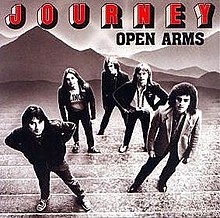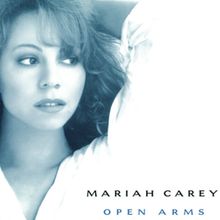
Journey is an American rock band formed in San Francisco in 1973 by former members of Santana, the Steve Miller Band, and Frumious Bandersnatch. The band as of 2024 consists of guitarist/vocalist Neal Schon, keyboardist/guitarist/vocalist Jonathan Cain, keyboardist/vocalist Jason Derlatka, drummer/vocalist Deen Castronovo, bassist Todd Jensen, and lead vocalist Arnel Pineda.
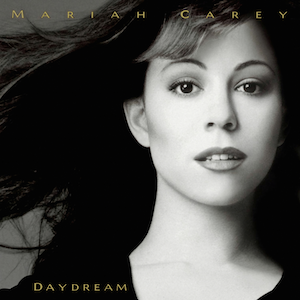
Daydream is the fifth studio album by American singer-songwriter Mariah Carey, released on September 26, 1995, by Columbia Records. The follow-up to her internationally successful studio album Music Box (1993), and the holiday album Merry Christmas (1994), Daydream differed from her previous releases by leaning increasingly towards urban music. Throughout the project, Carey collaborated with Walter Afanasieff, with whom she wrote and produced most of her previous albums. With Daydream, Carey took more control over the musical direction as well as the album's composition. Carey considered the album to be the beginning of her musical and vocal transition, a change that would become more evident in her sixth studio album Butterfly (1997). During the album's production, Carey endured many creative differences with her label and then-husband Tommy Mottola. On Daydream, Carey collaborated with Jermaine Dupri, Kenneth "Babyface" Edmonds, and R&B group Boyz II Men. With Afanasieff's assistance and the addition of a few contemporary producers, she was able to make a subtle transition into the contemporary R&B market, after previously only pursuing pop, adult contemporary and traditional R&B music.

"Forever" is a song recorded by American singer-songwriter, and record producer Mariah Carey for her fifth studio album, Daydream (1995). It was released by Columbia Records on June 18, 1996, as an airplay-only single and the fifth single from the album. The song was written and produced by Carey and Walter Afanasieff, and was composed throughout 1995. Its lyrics describe a situation where the protagonist knows her relationship with her lover has withered away, however he will continue living in her memory forever.
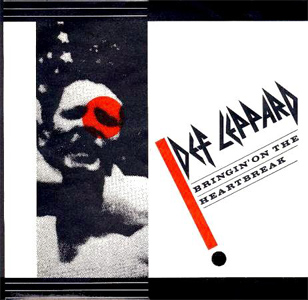
"Bringin' On the Heartbreak" is a song by English rock band Def Leppard. A power ballad, it was the second single from their 1981 album High 'n' Dry. The song was written by three of the band's members, Steve Clark, Pete Willis and Joe Elliott.
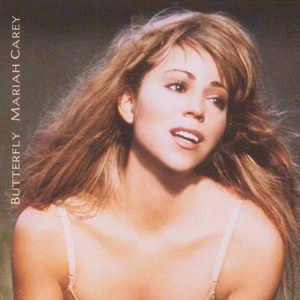
"Butterfly" is a song recorded by American singer-songwriter, and record producer Mariah Carey for her sixth studio album of the same name (1997). It was released on September 29, 1997, by Columbia Records as the second single from the album. The song was written and produced by Carey and Walter Afanasieff. "Butterfly" is a pop and R&B ballad combining elements of gospel. Carey had originally conceived it as a house record with David Morales titled "Fly Away" . After realizing how personal the lyrics were and how they could be applied to Butterfly, she wrote the album's title track with Afanasieff. On the song's lyrics, Carey sings to someone, telling them to spread their wings and release into the world on their own, like a butterfly.

"Make It Happen" is a song by American singer and songwriter Mariah Carey. Written and produced by Carey and C+C Music Factory's David Cole and Robert Clivillés. It was released on April 4, 1992, by Columbia Records as the third and final single from her second studio album, Emotions (1991). The pop-, R&B-, and dance-influenced track incorporates traces of gospel in its bridge and crescendo. Described by author Chris Nickson as Carey's most personal and inspirational song, it tells of her personal struggles prior to her rise to fame, and how her faith in God helped sustain her.
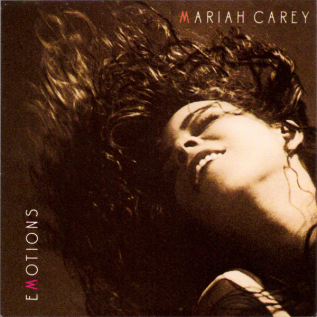
"Emotions" is a song recorded by American singer-songwriter Mariah Carey for her second studio album of the same name (1991). It was written and produced by Carey, Robert Clivillés, and David Cole of C+C Music Factory and released as the album's lead single on August 13, 1991 by Columbia Records. The song's lyrics has its protagonist going through a variety of emotions from high to low, up to the point where she declares, "You got me feeling emotions." Musically, it is a gospel and R&B song heavily influenced by 1970s disco music and showcases Carey's upper range and extensive use of the whistle register. Jeff Preiss directed the song's music video.

"I Don't Wanna Cry" is a song recorded by American singer Mariah Carey for her first album Mariah Carey (1990). Written by Carey and producer Narada Michael Walden, Columbia Records released it as the album's fourth single in March 1991. A Latin soul–influenced pop ballad, the torch song describes the end of romance. It features drums, guitars, digital synthesizers, and a classic song structure with highly delineated section roles. Modulations occur between these segments that emphasize the singer's emotions. Varying from whispering to belting, Carey's vocal range spans more than two octaves.
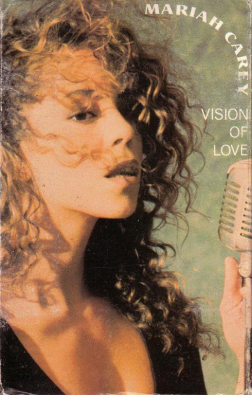
"Vision of Love" is the debut single by American singer-songwriter Mariah Carey for her eponymous debut studio album (1990). It was written by Carey and Ben Margulies. After being featured on Carey's demo tape for Columbia Records, the song was re-recorded and produced by Rhett Lawrence and Narada Michael Walden. The song features a slow-dance theme tempo and backing vocals sung by Carey herself, and introduces her usage of the whistle register. The lyric of the song represents her past life filled with "alienation" and how she had dreamt of achieving her triumph over adversity up to the moment when it finally came to fruition as the "vision of love" that she had always believed in, despite everything that she has had to deal with in life. This was Carey's debut record and was released as the lead single from Mariah Carey on May 15, 1990, by Columbia Records.

"My All" is a song by American singer-songwriter Mariah Carey from her sixth studio album, Butterfly (1997). It was released as the album's fifth single overall and second commercial single on April 21, 1998, by Columbia Records. The song was written and produced by Carey and Walter Afanasieff. "My All" is built around Latin guitar chord melodies, and makes subtle use of Latin percussion throughout the first chorus, before taking on a more conventional R&B-style beat. Carey was inspired to write the song and use Latin inspired melodies after a trip to Puerto Rico, where she was influenced by the culture. The song's lyrics tell of a lonely woman declaring she would give "her all" to have just one more night with her estranged lover. It is the first song Carey wrote for the Butterfly album.

"Hero" is a song by American singer-songwriter, and record producer Mariah Carey released on October 18, 1993, via Columbia Records as the second single from her third studio album, Music Box (1993). The song was written and produced by Carey and Walter Afanasieff. While writing the song, Carey did not connect to its style or sound, therefore forfeiting it to Gloria Estefan, who was intended to sing it for the soundtrack of the film of the same name (1992). However, after being convinced by Sony executive Tommy Mottola to keep it for herself, she changed some of the lyrics to more precisely fit her personality. Lyrically, the song is regarded as one of Carey's most inspirational and personal ballads, with its protagonist declaring that even though people may feel discouraged or down at times, in reality, they are "heroes" if they look inside themselves and see their own inner strength; in time, it will help them "find the way".

"Fantasy" is a song by the American singer-songwriter Mariah Carey. It was released on August 23, 1995, by Columbia Records as the lead single from her fifth album, Daydream (1995). The track was written and produced by Carey and Dave Hall. It samples Tom Tom Club's 1981 song "Genius of Love". The lyrics describe a woman who is in love with a man, and how every time she sees him she starts fantasizing about an impossible relationship with him. The remix for the song features rap verses from Ol' Dirty Bastard, something Carey arranged to assist in her crossover into the hip-hop market and credited for introducing R&B and hip hop collaboration into mainstream pop culture, and for popularizing rap as a featuring act.
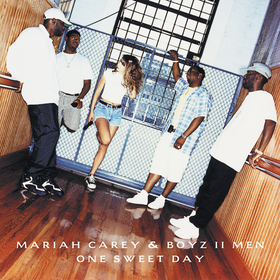
"One Sweet Day" is a song by American singer-songwriter Mariah Carey and American vocal group Boyz II Men. The song was released on November 14, 1995, as the second single from the former's fifth studio album, Daydream (1995) by Columbia Records. The artists co-wrote the song with Walter Afanasieff, who co-produced it with Carey. Lyrically, the song speaks about the death of a loved one, how the protagonist took their presence for granted and misses them, and finally about seeing the person in heaven. The artists wrote the song about specific people in their lives, being inspired by sufferers of the AIDS epidemic, which was globally prevalent at the time.

"Always Be My Baby" is a song recorded by American singer-songwriter, and record producer Mariah Carey for her fifth studio album, Daydream (1995). It was released by Columbia Records on February 20, 1996, as the third single in the United States and fourth worldwide. Written and produced by Carey, Jermaine Dupri and Manuel Seal, "Always Be My Baby" is a midtempo song, with lyrics describing the feeling of attachment and unity the singer feels towards her estranged lover, even though they are no longer together, she says he will always be a part of her and will "always be her baby" even after they move on.

Rainbow is the seventh studio album by American R&B singer Mariah Carey, released on November 2, 1999, by Columbia Records. The album followed the same pattern as Carey's previous two albums, Daydream (1995) and Butterfly (1997), in which she began her transition into the urban adult contemporary market. Rainbow contains a mix of hip hop-influenced R&B tracks, as well as a variety of ballads. Carey produced the album with David Foster and Diane Warren, who, as well as Jimmy Jam & Terry Lewis, replaced Walter Afanasieff, the main balladeer Carey worked with throughout the 1990s. As a result of her separation from her husband, Tommy Mottola, Carey had more control over the musical style of this album, so she collaborated with several hip-hop artists such as Jay-Z, Snoop Dogg, Master P and Mystikal as well as female rappers Da Brat and Missy Elliott. Other collaborations include the pop and R&B acts Joe, Usher and boyband 98 Degrees.

Merry Christmas is the fourth studio album by American singer-songwriter Mariah Carey, and her first Christmas album. Released by Columbia Records on October 28, 1994, at the peak of the initial stretch of Carey's career, between Music Box (1993) and Daydream (1995), the album features cover versions of popular Christmas songs in addition to original material. Carey worked with Walter Afanasieff, with whom she wrote all of the original tracks, as well as producing Carey's interpretations of the covered material. Three singles were released from the album, of which "All I Want for Christmas Is You" went on to become one of the best-selling singles of all time and the best-selling Christmas ringtone in the United States.

"Never Forget You" is a song recorded by American singer Mariah Carey for her third studio album, Music Box (1993). Carey co-wrote the slow jam with Babyface and the pair produced it with Daryl Simmons. Columbia Records released the song on January 21, 1994, as the B-side to "Without You" and promoted it to American urban contemporary radio stations as the album's fourth single. The lyrics lament the end of a romance. Strings, synthesizers, and percussion characterize the composition; Jermaine Dupri altered them for remixes.

"Don't Stop Believin'" is a rock song by American band Journey. It was released in October 1981 as the second single from the group's seventh studio album, Escape (1981), released through Columbia Records. "Don't Stop Believin'" shares writing credits between the band's vocalist Steve Perry, guitarist Neal Schon, and keyboardist Jonathan Cain. A mid-tempo rock anthem and power ballad, "Don't Stop Believin'" is memorable for its distinctive opening piano riff.

"Any Way You Want It" is a song by American rock band Journey, released in February 1980 as the lead single from the band's sixth album Departure (1980). Written by lead singer Steve Perry and guitarist Neal Schon, it peaked at number 23 on the US Billboard Hot 100 chart.

The Daydream World Tour was the second concert tour by American singer-songwriter Mariah Carey in support of her fifth studio album Daydream (1995). The tour lasted seven shows, starting on March 7, 1996, in Tokyo, Japan, and ending on June 23, 1996, in London, England.
